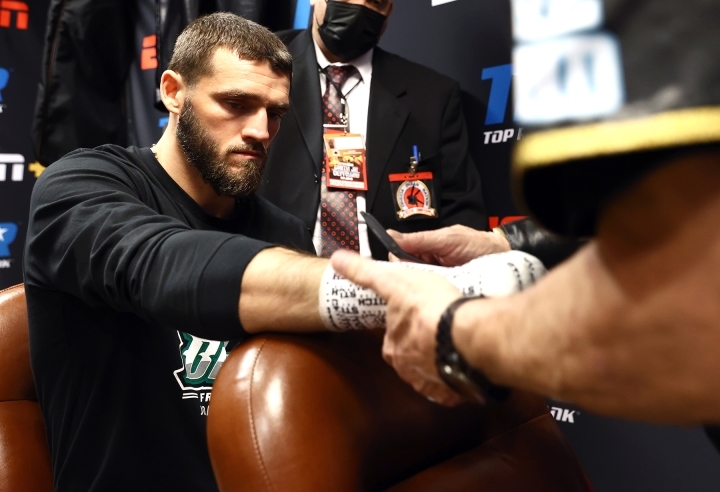In an era in which hustle culture is glamorized, there’s no shortage of people who proclaim they’re never not working. For some that may be true, although for those for whom it is, it’s likely not something they’re particularly happy about. For others, it’s a more boastful, if not disingenuous way of embracing a bootstrap mentality.
Joe Smith Jr. is one of the select few for whom “never not working” can seemingly actually apply, and measured against the population, it would be hard to find a person with a collection of jobs more physically demanding than the ones Smith has chosen and enjoys.
When he isn’t hauling cement or digging ditches as a general laborer as part of the Local 66 union, he’s chopping trees and dragging brush for his family tree removal business with his father. When he isn’t doing those things, he’s training to remain a world champion boxer, which at times in the past has meant skipping lunch to do roadwork—the boxing kind, not the kind he took a 30-minute meal break from. Once he’s in the ring, his motto is the same as the one Team Smith Tree Removal has: He won’t leave until the customer is happy.
In boxing, the customer is almost always happiest with a knockout, and Smith’s path to producing them is paved with a mix of brute force and relentless activity. On Saturday night in Verona, NY, Smith sent the fans at Turning Stone Casino and watching on ESPN away happy, as he knocked out late-replacement Steve Geffrard in the ninth round to retain his WBO light heavyweight title.
Geffrard stepped in to replace Callum Johnson against Smith on just eight days’ notice, entering at a decided disadvantage. In his time as a world-ranked fighter, Smith has only really been a betting favorite once, against Maxim Vlasov, and probably hasn’t been a heavy favorite the way he was against Geffrard (-1600 in some places) since his days on the New York club circuit. In these types of situations, against a short-notice opponent of lesser esteem than the one previously scheduled, fighters can sometimes ease up and underwhelm. In the broader sports landscape this scenario is referred to as a “trap game.” In boxing specifically, fighters coming in on short notice seldom win, but it’s not uncommon particularly at the higher levels for them to make their opponent look bad in a losing effort.
But Joe Smith doesn’t do shoddy work. He doesn’t put in a lesser effort just because the job isn’t as glamorous as the next. The echo of the ring bell hadn’t even faded out by the time Smith galloped across the ring and forced Geffrard back towards the ropes. In all, he chucked 665 punches in less than nine rounds, a clip of over 80 punches per round had the ninth round been completed and he’d remained at the same pace. A volume well beyond the light heavyweight average, a pace some 115-pounders would consider a busy night.
Geffrard presented an interesting defensive puzzle, an air-tight high guard and a willingness to catch everything thrown at him. Unfortunately, Smith’s power and volume are built to chip away at defenses built on attrition. Slowly over time, the effect of Smith’s heavy hands connecting on Geffrard’s arms and gloves began to take a toll. In the second round Smith landed 19 punches, and by the eighth he landed 35. Right hands that were being absorbed by Geffrard’s guard were now landing on his chin and temple. By the ninth round he could absorb no more, and remained on a knee for the count of ten.
“He really brought it today,” said Smith in his post-fight interview. “He’s a great boxer, a good survivor. I was trying to get him out of there early, but I realized he was very tough and I wasn’t gonna be able to do that. I tried to wait until the later rounds and started throwing more combinations to pick him apart.”
Following his title-winning performance over Maxim Vlasov in April of 2021, Smith expressed remorse over how “hesitant” he was—in a fight in which he threw 888 punches. This version of Smith, the one reliant upon tireless volume, was likely born after an actual hesitant performance against Dmitry Bivol in 2019 in which he threw just 395 punches. Heading into that fight, Smith averaged 41.7 punches per round, more than ten punches less than the 175-pound average at the time.
The loss to Bivol represents a turning point in Smith’s career both in terms of success and in-ring identity. Since then, he’s won four straight and captured a world title. To do so, he’s borrowed from lessons learned on the job site: You can have the most powerful tools in the world, but you need the workforce to operate them. His God-given knockout power was useless if he wasn’t throwing punches often enough. According to ComuBox’s Dan Canobbio, over his last three fights, Smith is averaging 68 punches per round (17 more than the light heavyweight average) while landing 40.4% of his power shots.
In other words, Smith has discovered what makes him different from most people. His capacity for work, and his ability to cherish the act of doing it.
“I want to get back in the gym, work on my craft,” said Smith following the Geffrard bout. “Like I say, each and every time I get in the ring, I’m gonna get better and better. I believe the next time you see me, I’ll be ready for anybody.”
Corey Erdman is a boxing writer and commentator based in Toronto, ON, Canada. Follow him on Twitter @corey_erdman
